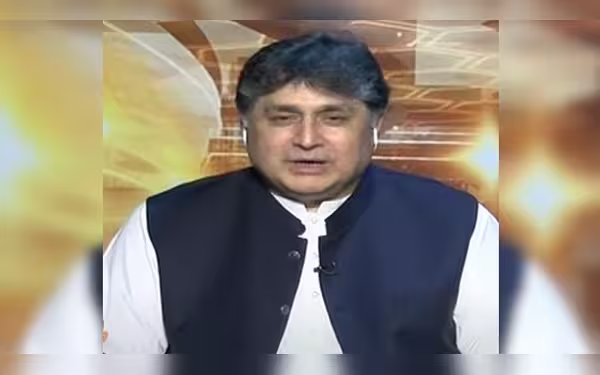Saturday, November 16, 2024 07:24 PM
Fawad Hassan Critiques PIA Privatisation Process Amid Lack of Bidders
- Fawad Hassan questions sole bidder's aviation background.
- Criticism of government's decision-making in PIA privatisation.
- Provincial governments show interest in acquiring PIA.
 Image Credits: geo
Image Credits: geoFawad Hassan criticizes the lack of bidders in PIA's privatisation, highlighting decision-making failures and provincial interest in acquisition.
The privatisation of Pakistan International Airlines (PIA) has been a contentious issue for years, with various attempts made to divest the struggling national carrier. Recently, former interim minister for privatisation, Fawad Hassan, expressed his astonishment at the cabinet's decision to proceed with the privatisation process with only one bidder. This sole bidder, Blue World City, offered a mere Rs10 billion for a 60% stake in PIA, which is significantly below the minimum asking price of Rs85 billion. The situation raises questions about the effectiveness of the privatisation strategy and the decision-making processes involved.
During a recent appearance on the Geo News programme "Jirga," Fawad Hassan pointed out that the lack of a competitive bidding process undermined the entire effort to privatise PIA. He questioned, "What was the need for bidding if there was only a sole bidder, who does not have an aviation background?" This sentiment reflects a broader concern regarding the government's approach to privatisation, particularly in the context of a national asset that has been in decline for years.
Fawad Hassan further elaborated on the challenges faced during the privatisation process, stating that a "lack of decision-making" was a significant factor in the failure to attract more bidders. He emphasized that the privatisation process cannot be successful without timely and informed decisions. Highlighting his own contributions, he noted that for the first time in Pakistan's history, serious steps were taken towards the privatisation of PIA, which had seen little meaningful progress prior to September 2023.
In his remarks, Fawad mentioned that he had to take direct financial control of PIA after realizing that the aviation division was not serious about the privatisation efforts. He claimed to have completed the restructuring of PIA's substantial debt, which amounted to Rs281 billion, and managed to save the airline Rs35 billion annually through renegotiations. These achievements underscore the complexities involved in managing a state-owned enterprise that has been plagued by financial difficulties.
Former finance minister Miftah Ismail also weighed in on the situation, criticizing the current government led by Prime Minister Shehbaz Sharif. He stated, "Neither [Prime Minister] Shehbaz Sharif has any track record of undertaking privatisation [of any state-owned entity] nor any intention." This criticism highlights a perceived lack of commitment from the government to effectively manage and privatise state-owned enterprises.
In a surprising turn of events, both the Khyber Pakhtunkhwa and Punjab provincial governments expressed interest in acquiring PIA. Miftah Ismail dismissed these proposals, stating, "No government in the world operates airlines," and emphasized that the primary responsibilities of provincial governments should be to provide education, health, and convenience to their citizens. This perspective raises important questions about the role of provincial governments in managing national assets and the feasibility of such acquisitions.
As the situation unfolds, it is clear that the privatisation of PIA is fraught with challenges and complexities. The failure to attract competitive bids and the ongoing debates about the role of government in airline operations highlight the need for a more strategic approach to privatisation. Moving forward, it is essential for the government to engage in transparent decision-making processes and to consider the long-term implications of their actions on the national carrier and the economy as a whole. The future of PIA remains uncertain, but the lessons learned from this experience could pave the way for more effective privatisation efforts in the future.













